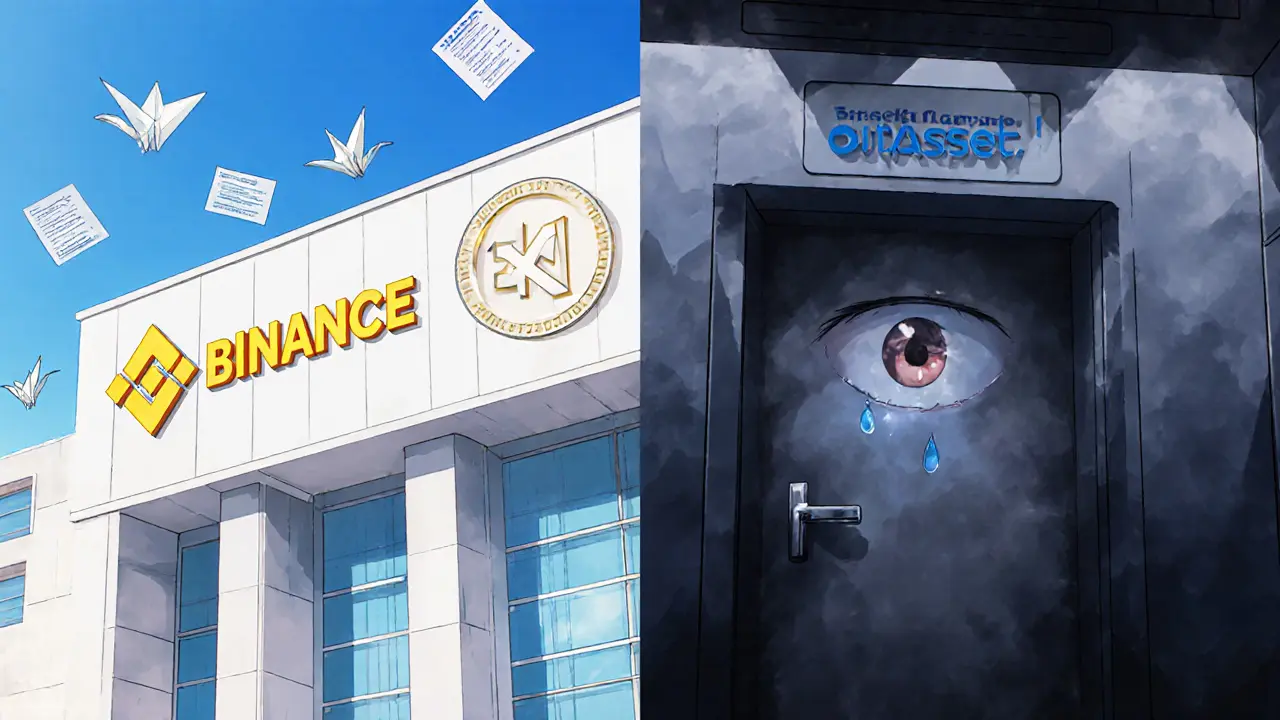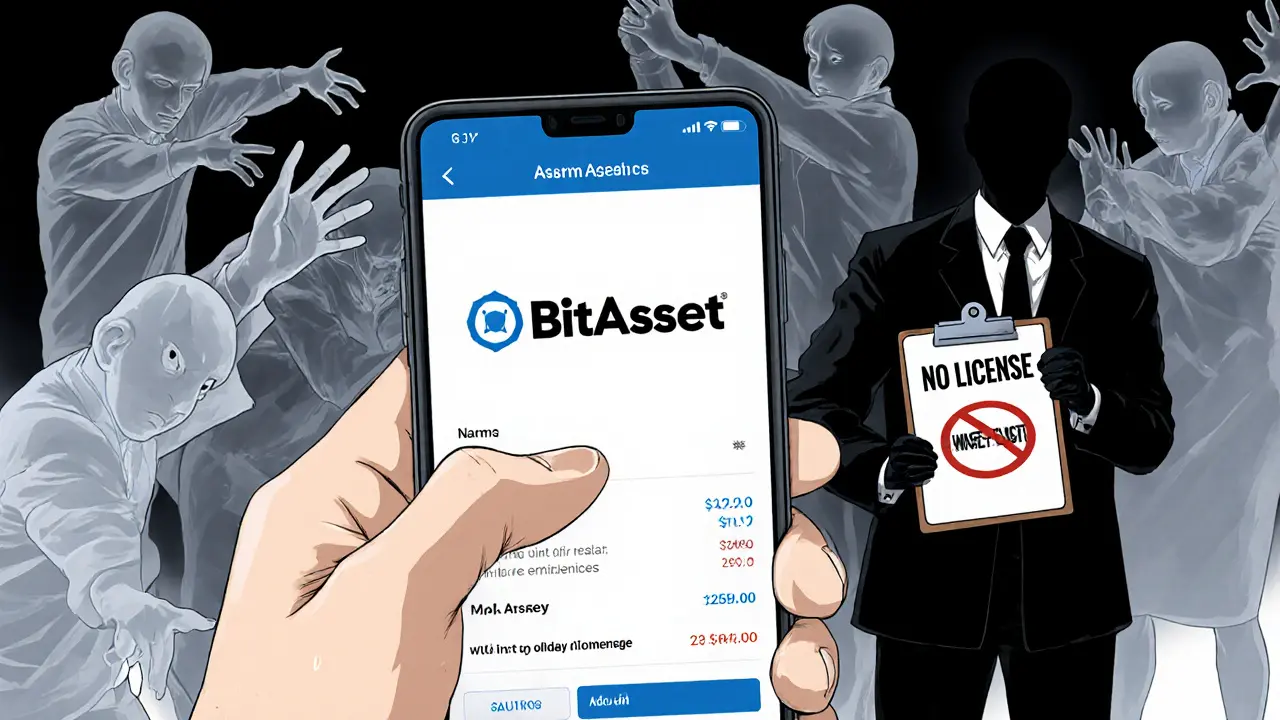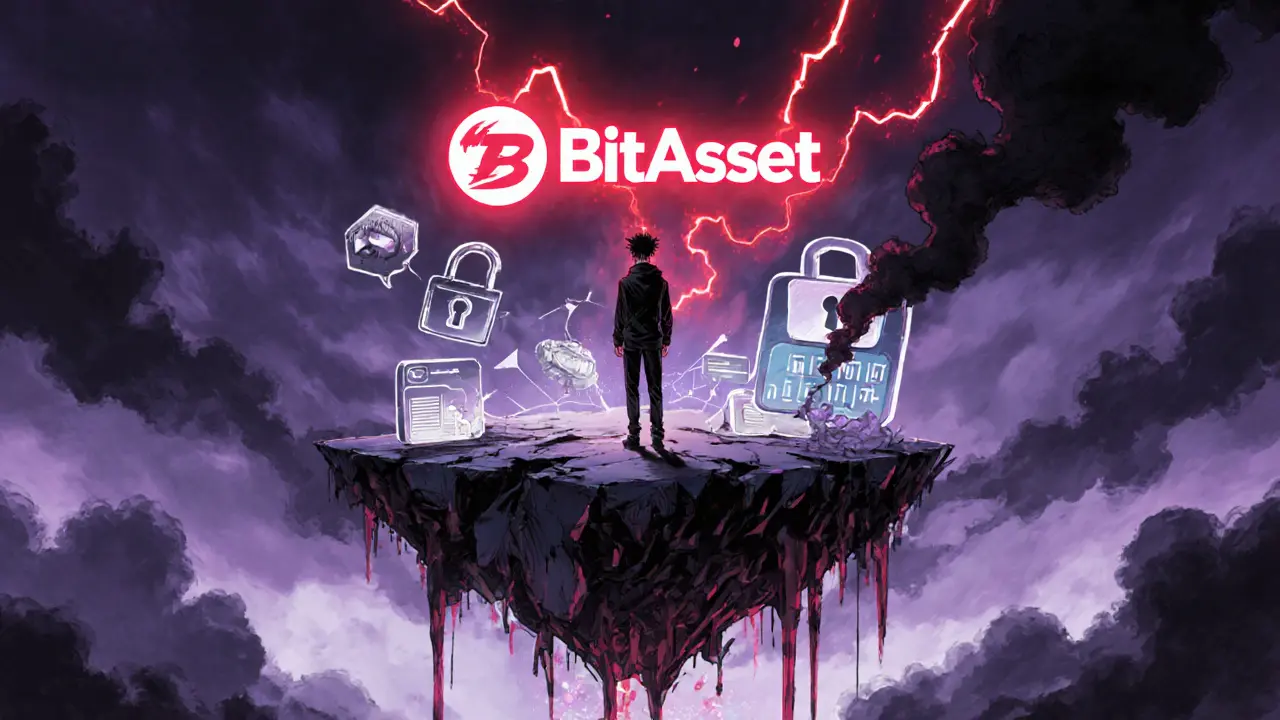Crypto Exchange Safety Checker
Is This Exchange Safe?
Check if your crypto exchange meets minimum safety standards for regulatory compliance, security transparency, and fund protection.
Safety Assessment Results
Based on industry standards for crypto exchange security and regulatory compliance
Important Safety Note
A safety score below 60% indicates significant risk. Exchanges scoring below 40% should be avoided entirely, especially for holding significant funds.
When you’re looking for a crypto exchange, you want one that’s secure, transparent, and regulated. BitAsset claims to be a derivatives-focused platform with 24/7 support and high trading volumes. But behind the marketing, there are serious red flags that make it one of the riskiest options on the market in 2025.
What BitAsset Actually Offers
BitAsset markets itself as a platform for trading cryptocurrency derivatives-things like futures and perpetual contracts-using smart contracts. It says it supports over 100 trading pairs, which sounds impressive. But here’s the problem: no one can verify that anymore. Back in 2019, BitAsset reported $1.08 billion in 24-hour volume. By early 2020, that number had already dropped to $290 million. Today, there’s no public data showing current trading activity. No live volume charts. No order book depth. No API access for third-party tools. That’s not normal for a real exchange. Legitimate platforms like Binance or KuCoin publish this data openly because they have nothing to hide. BitAsset also claims to offer 24/7 customer support. That sounds great-until you realize no one can confirm if it’s actually true. Users report long wait times, unanswered tickets, and support that disappears during critical market moves. If your funds are on the line, you need support that works, not just a promise on a website.The Regulatory Nightmare
This is where BitAsset falls apart completely. There is no clear regulatory license. No government body, no financial authority, no public record of registration. Not in Hong Kong, not in the Caymans, not anywhere. Most reputable crypto exchanges make their licenses easy to find. Binance has licenses in multiple jurisdictions. KuCoin is registered with FINTRAC in Canada and holds a license in Malta. Even smaller platforms like Bybit publish their compliance details. BitAsset? Nothing. Not even a vague mention of “compliance with international standards.” Just silence. And yet, BitAsset blocks users from the United States. That’s not a sign of compliance-it’s a sign of avoidance. Legitimate platforms that can’t serve U.S. users because of strict regulations still operate under a known legal framework. BitAsset doesn’t even claim one. That’s not compliance. It’s evasion.Security: No Transparency, No Trust
Crypto exchanges protect your money in two ways: cold storage and insurance. BitAsset doesn’t disclose either. Do they use multi-sig wallets? Do they have a proof-of-reserves audit? Is any portion of user funds insured against hacks? No answers. No reports. No third-party audits ever published. Not even a statement saying they’re working on it. Compare that to Kraken, which publishes monthly reserve proofs. Or Coinbase, which carries $255 million in crime insurance. BitAsset doesn’t even pretend to offer that level of protection. If you deposit funds here, you’re trusting a black box with no visibility into how your assets are stored-or if they’re even still there.
User Reports: Mixed at Best, Alarming at Worst
Some users say they’ve made profits on BitAsset. Others say they couldn’t withdraw after a big win. Some report fast deposits. Others say their withdrawals took weeks-or never arrived. A pattern emerges: when markets are calm, things seem fine. But when volatility hits, problems appear. Withdrawal delays. Account freezes. Customer service vanishing. These aren’t isolated complaints. They’re consistent across forums, Reddit threads, and independent review sites. One user posted on CryptoCompare in March 2025: “I tried to pull out $12,000 after a 300% gain. They said ‘security review.’ Two weeks later, my account was locked. No response from support.” That’s not a glitch. That’s a red flag.Why BitAsset Still Exists (And Why You Should Avoid It)
The crypto space is full of platforms that look legit but aren’t. BitAsset fits that mold perfectly. It uses professional-looking design, technical jargon like “smart contract derivatives,” and fake volume claims to trick new traders into thinking it’s a real player. It’s not a startup struggling to grow. It’s a platform that’s been around since at least 2019 and still hasn’t addressed the most basic trust issues. That’s not incompetence. That’s intentional. In 2025, the market has moved on. Regulators are cracking down. Exchanges without licenses are being shut down or fined. BitAsset hasn’t been shut down-not because it’s safe, but because it’s too small to be a priority. That’s not a good sign. It means it’s operating in the shadows.
What to Do Instead
If you want to trade crypto derivatives safely, there are better options:- Binance: Largest derivatives volume, clear licenses in multiple regions, regular audits.
- Bybit: Transparent fee structure, strong security, active community.
- KuCoin: Supports hundreds of tokens, good customer service, licensed in several jurisdictions.
- OKX: Strong compliance, insurance fund, institutional-grade tools.
Final Verdict: Avoid BitAsset
BitAsset is not a scam in the classic sense-it doesn’t have a website that disappears overnight. But it’s a gray-area platform built on silence, evasion, and unverified claims. In crypto, silence isn’t neutrality. It’s danger. If you’re a beginner, stay far away. If you’re experienced, ask yourself: why risk your capital on a platform that won’t even tell you where your money is stored? There’s no reward worth the risk here. The market is full of legitimate alternatives. You don’t need BitAsset. You don’t want BitAsset. And in 2025, you absolutely shouldn’t use it.Is BitAsset a legitimate crypto exchange?
No, BitAsset is not a legitimate exchange by current industry standards. It lacks any verifiable regulatory license, publishes no security audits, and provides no transparency about fund storage or insurance. While it hasn’t been officially shut down, its silence on critical compliance issues makes it a high-risk platform that experts advise avoiding.
Can I withdraw my funds from BitAsset?
Some users report successful withdrawals during calm market periods. But many others describe delays, locked accounts, and unresponsive support-especially after large withdrawals or during volatility. There’s no guarantee you’ll get your money out when you need it. This inconsistency is a major red flag.
Why does BitAsset block U.S. users?
BitAsset blocks U.S. users likely because it doesn’t hold any U.S. regulatory licenses, such as a Money Services Business (MSB) registration or state-level BitLicense. Many offshore exchanges do this to avoid legal exposure. But unlike regulated platforms that clearly state their compliance stance, BitAsset offers no explanation at all, making its motives unclear and suspicious.
Does BitAsset have a mobile app?
Yes, BitAsset offers a mobile app for iOS and Android. But the app’s functionality mirrors the website’s risks: no transparency, no audit reports, and no clear security disclosures. A mobile app doesn’t make a platform safe-it just makes it more convenient to lose money.
What are safer alternatives to BitAsset?
Safer alternatives include Binance, Bybit, KuCoin, and OKX. These platforms are licensed in multiple jurisdictions, publish regular security audits, offer insurance funds, and have proven track records of handling withdrawals reliably. They also have active customer support and transparent fee structures-none of which BitAsset provides.
Has BitAsset ever been hacked?
There’s no public record of a confirmed hack on BitAsset. But that’s not reassuring-it’s suspicious. Legitimate exchanges report breaches transparently, even small ones, to maintain trust. BitAsset’s silence on security incidents suggests either extreme luck or a lack of accountability. Neither is a good sign.
Is BitAsset regulated in Hong Kong?
There is no public evidence that BitAsset is registered or licensed by Hong Kong’s Securities and Futures Commission (SFC) or any other local authority. While some sources refer to it as a “Hong Kong-based exchange,” no official records confirm this. Without a license, location means nothing in crypto regulation.
Can I trust BitAsset’s trading volumes?
No. BitAsset’s reported volumes from 2019 and 2020 are inconsistent with current market data and are no longer visible on public trackers like CoinMarketCap or CoinGecko. Many unregulated exchanges inflate volume numbers to appear more popular. Without real-time, verifiable data, these figures are meaningless-and likely misleading.
What should I look for in a safe crypto exchange?
Look for: 1) Clear regulatory licenses, 2) Published proof-of-reserves audits, 3) Insurance coverage for user funds, 4) Transparent fee structure, 5) Responsive customer support with public track records, and 6) Active community and third-party reviews. BitAsset meets none of these. Choose platforms that do.
Should I use BitAsset for derivatives trading?
No. Derivatives trading is already high-risk. Adding an unregulated, opaque platform like BitAsset multiplies that risk exponentially. Even experienced traders avoid platforms without transparency. If you want to trade futures or perpetuals, use a licensed exchange with a proven history of security and reliability.


18 Responses
bitasset? lol just don’t touch it. i lost my dog’s food money there. no refunds. no replies. just silence.
so many people get burned thinking they can ‘get lucky’ on these shady platforms… you’re not a trader if you’re gambling on something no one can verify. take a breath, step back, and pick one that actually cares about you. 🙏
bro from india here - we got scams like this everywhere, but this one’s extra sneaky. they use fancy words like ‘smart contracts’ to make you think they’re tech geniuses… but if they can’t show you where your coins are, they’re just holding your cash like a hostage. 😒
i’ve been tracking this platform since 2020. the drop in volume wasn’t just a dip - it was a freefall. and the fact they still haven’t updated their site or published a single audit? that’s not negligence. that’s planning. they know people will keep depositing because the interface looks clean and the ‘24/7 support’ banner is blinking. but when you try to withdraw? suddenly your account’s under ‘review’ for 17 days. i’ve seen this script before - it’s not crypto, it’s a Ponzi with a trading terminal.
One must question the epistemological foundations of trust in decentralized finance when entities operate with such profound opacity. The absence of regulatory disclosure is not merely an oversight - it is a categorical negation of fiduciary responsibility. To entrust one’s capital to such an entity is not an act of investment, but of existential surrender.
lol i tried to withdraw $800 last month. said ‘security review’. then my account got banned. i guess i’m not allowed to profit? 🙄
you guys are being way too nice. this isn’t just sketchy - it’s predatory. they’re targeting newbies with fake volume graphs and ‘high leverage’ ads. i’ve seen people cry in forums because they lost their rent money. these people are criminals. they should be in jail, not running a website. 💀
THEY’RE NOT EVEN TRYING TO HIDE IT ANYMORE!!! I SAW A VIDEO ON TIKTOK WHERE SOME GUY WAS SAYING ‘BITASSET IS THE FUTURE’ - AND THEN HIS SCREEN SHOWED HIS BALANCE AT $0.00 AFTER A ‘SYSTEM UPDATE’!!! THIS ISN’T A PLATFORM - IT’S A DIGITAL MUGGING. 🚨🔥
my cousin used bitasset last year… said it was ‘fine’ until he tried to cash out after a win. then poof. no email replies, no live chat, no nothing. he’s still waiting. i told him to stop checking his account. he did. he’s better off now. 🤷♀️
i’m a teacher and i’ve got students asking me about this. i showed them the difference between bitasset and binance - one has a license, audits, and real support. the other has a nice logo and promises. guess which one i told them to avoid? 🧠
man i used to think all offshore exchanges were shady… but bitasset? it’s like they hired a designer to make a website that looks legit, then forgot to build the backend. no wonder they block the US - they know americans will actually read the fine print.
oh wow, a crypto platform that doesn’t have a license… how novel. i’m shocked. 🤡 next they’ll tell me the moon landing was faked too. but hey, at least their mobile app has a cool gradient background, right?
you’re all amateurs. this isn’t even worth discussing. bitasset is a glorified front for money laundering. anyone who deposits here deserves to lose it. the fact you’re surprised? that’s your real problem. learn to read between the lines before you gamble with your life savings.
if you’re thinking about using bitasset, ask yourself: would i hand my house keys to a stranger who won’t tell me where they live? no? then why hand over your crypto? check the licenses, check the audits, check the support history. if it’s not there - walk away. seriously. your future self will thank you.
the fact that this post even exists is a good sign - people are finally waking up. i hope this helps someone avoid disaster. you don’t need to chase ‘high returns’ - you need to keep your money safe. stay strong, stay smart.
the regulatory silence is the most damning evidence. in the EU, even a micro-exchange must register with the FCA or equivalent. BitAsset’s lack of any registration - not even a failed application - suggests either incompetence or malice. Neither is acceptable. The absence of evidence is not evidence of absence - it is evidence of evasion.
if you’re still using bitasset… i’m sorry. 😔 you deserve better. go to binance. go to kucoin. they’ve got your back. you’re not a bad trader - you just got tricked. fix it. you got this 💪🔥
just read this post before depositing a single cent. saved me $5k. thank you. i’m telling everyone i know.